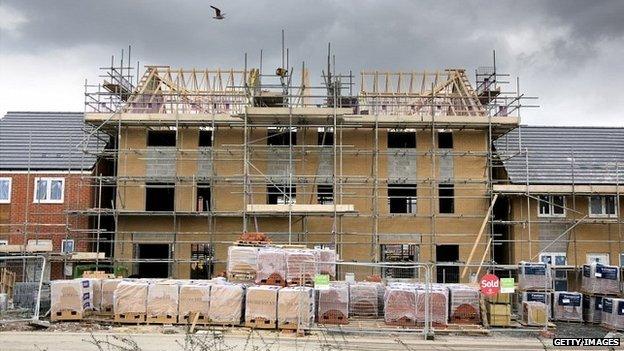England 'exposed' to climate risks
- Published
- comments

Buildings are still being designed with past climate in mind, the advisers say
England is still not doing enough to tackle the risks from climate change, government advisers say.
The Committee on Climate Change (CCC) says three-quarters of existing flood defences are inadequately maintained because of a cash shortage.
Rules to avoid floods affecting new developments have also been delayed.
The government says it has offered an extra £270m to repair storm-damaged defences and is committed to adapting infrastructure to extreme weather.
But the CCC says that at current rates of investment in flood defences, flood risks for people in England will increase.
The chair of its adaptation sub-committee, Lord Krebs, told BBC News: "The £270m announced by government is a one-off payment to repair damage - not to invest in the future.
"The Environment Agency shows unless that increased investment is sustained until the 2020s, the risk of flood damage will actually increase.
"If you don't maintain defences properly you will just stack up problems. We are calling on the government to be transparent and explain the rationale behind their policy."
Lord Krebs's report does offer praise in some quarters. It says the often-criticised power firms have set an example by increasing resilience to the sort of heavy storms likely if, as expected, the climate warms further. Railways are improving their preparedness in some areas, too, it says.
But it urges that a comprehensive approach should also be adopted for water companies, major roads, ports, airports, and telecommunications.
The report admits that accurately foretelling the UK's future weather is impossible, but it stresses the need to be resilient to extremes of all kinds.
It maintains that the threat from heatwaves has been too little discussed. It says homes and public buildings are still being constructed for the past climate instead of the future climate, and warns that premature deaths from overheating could triple to 7,000 per year by the 2050s as temperatures rise and the population ages.
The CCC estimates that a fifth of homes are already at risk of overheating, even in a cool summer, and mentions forthcoming research from Cambridge University which concludes that 90% of hospital wards are already prone to overheat.
Lord Krebs said: "There has been a lot of emphasis on energy saving, rightly so, but not enough on the risk of overheating in homes, hospitals and care homes.
"We're saying: don't wait and rely on air-con. Install shutters or blinds or tinted windows - or external insulation. And we think new-build properties need new building standards to prevent overheating."
The report calls on local councils to publish statutory flood risk management plans and take any actions agreed. A minority of councils, it says, are so strapped for cash that they have diverted flood investments into other spending priorities.
It complains that government has also failed to introduce new rules for developments to be self-draining, rather than plugging into the already-stressed sewer network (as recommended in the Pitt Review on flooding).
The committee members also complain that intensive farming is still being supported in areas where the ground needs natural vegetation to soak up rainfall.
A shortage of funds in the Environment Agency also means that small developments on flood plains cannot be scrutinised for their impact on flooding.
"There may be reasons for building on flood plains," Lord Krebs said. "But there could be up to 12,000 homes going on flood plains with no advice - and that's just stacking up problems again as sea levels rise and extreme weather events are expected."
A government spokesman said: "We are spending £3.2bn over the course of this Parliament on flood management and protection from coastal erosion.
"We are committed to addressing the risks from climate change - by increasing awareness and making far-sighted decisions we can address these risks, save money and safeguard our homes and communities for the future."
Maria Eagle MP, Labour's shadow environment secretary, said: "The government's failure to get to grips with the increasing impact of climate change threatens our national security.
"Of course tough decisions have had to be made on spending to reduce the deficit, including within Defra, but we need to end short-termism to ensure we are not storing up problems."
Follow Roger on Twitter @rharrabin